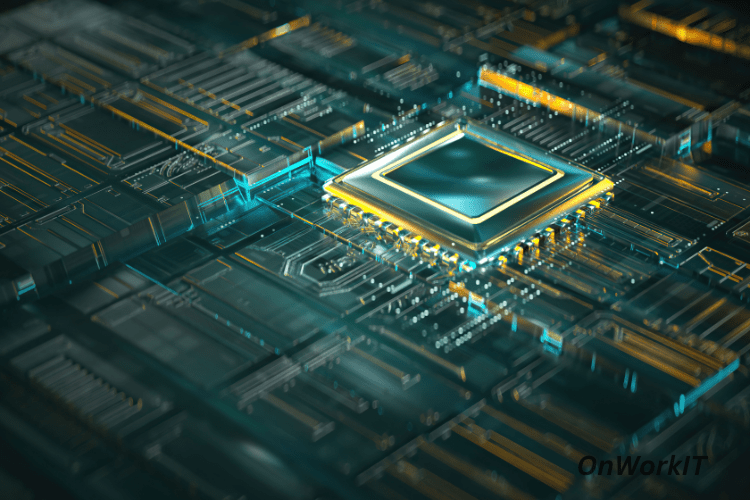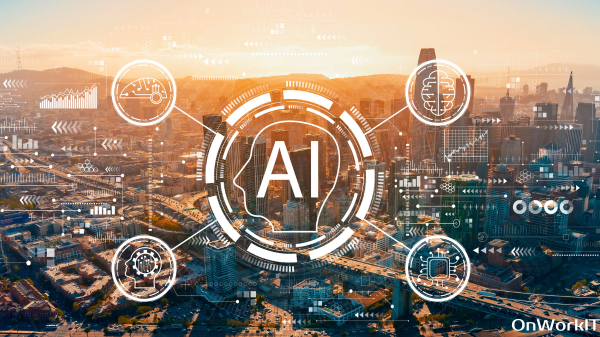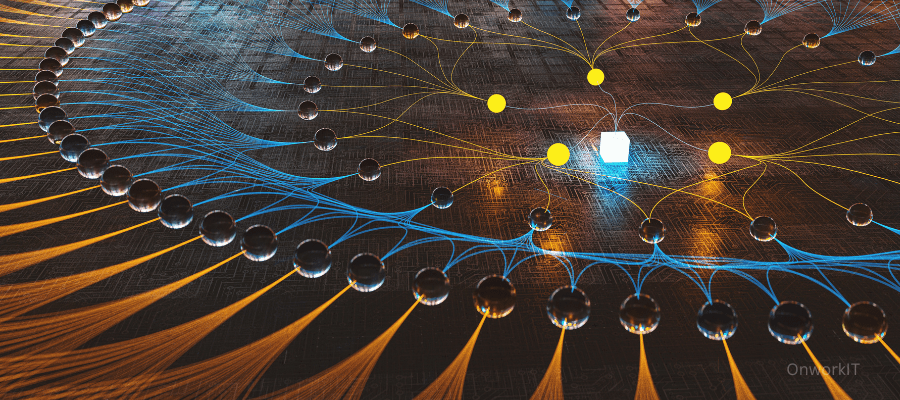Introduction to Quantum Computing
Quantum computing is a major change in the world of computation, since it uses quantum physics ideas to process data in a way that normal computers are unable to. Superposition and entanglement are two fundamental quantum mechanical events that serve as the cornerstone of quantum computing.
Superposition allows qubits, or quantum bits, to live in several states simultaneously. Qubits are capable of being in any quantum combination of 0, 1, or both, while conventional bits are limited to one of three states. Quantum computers are capable of performing several computations simultaneously, which greatly boosts their processing capability for specialized purposes.
Entanglement is another essential idea that elucidates the mechanism by which two qubits may get interlaced and entangled to the point that their states directly affect one another, regardless of their distance from one another. This link allows quantum computers to handle complicated problems more quickly by offering instantaneous communication between qubits.
Quantum gates, which are the quantum equivalents of standard logic gates, are applied to perform these concepts. Quantum gates allow the execution of quantum algorithms by performing unitary changes on qubits. Quantum algorithms show how quantum computing may be applied to overcome clearly insurmount challenges for conventional computers. These approaches combine Shor’s method for factoring huge numbers and Grover’s solution for search problems.
As we keep learning about the topic of quantum computing. It is clear that this creative method may change many other areas, including material science, cryptography, artificial intelligence, and others as well. The fundamental understanding of quantum gates, quantum algorithms, and qubits opens the route for deeper research on the most recent successes and the vital part artificial intelligence plays in the evolution of quantum computing.
Recent Discoveries in Quantum Computing
Many innovative quantum computing advances in recent years are moving the science toward useful uses closer. The advancement of quantum hardware—more especially, in terms of qubit stability and coherence time—has been one of the most obvious benefits. Coherence durations—which are necessary to keep quantum states long enough for advanced computations—have been successfully enhanced by researchers. For instance, Google and IBM have showed great improvements in their qubit technology, thereby offering more trustworthy and scalable quantum processors.
Regarding quantum algorithms and software, tremendous work has been achieved. New answers for problems that conventional computers cannot solve have been made available by sophisticated quantum algorithms. Existing methods as the Quantum Approximate Optimization Algorithm (QAOA) and the Variational Quantum Eigensolver (VQE) are under ongoing research. Their actual application flexibility and efficiency. These developments are important in areas including material science, health, and encryption where quantum computing may greatly modify techniques and results.
Discovery in educational field
Leading academic institutions including MIT, Stanford, and the University of Oxford as well as technological behemoths as Microsoft, IBM, and Google constantly post key study papers and programs. For instance, MIT has recently made great progress in creating a new error-correction strategy that greatly decreases mistake rates in quantum computing. Likewise, Google’s Quantum AI team has received media attention for their quantum supremacy research, which demonstrate how their Sycamore processor may, in some cases, beat traditional supercomputers.
These theoretical gains open the road for real applications of quantum computing and signify intellectual revolution. Given the use of artificial intelligence (AI) to improve quantum experiments and data analysis speeds these results, the future of quantum computing seems to be pretty dazzling.

Driving major improvements and growing several areas of quantum computing is artificial intelligence (AI). Algorithm optimization is one of the most famous uses of artificial intelligence in quantum computing. Built on quantum algorithms, which let it handle difficult problems far quicker than conventional computers, quantum computing is Machine learning and other artificial intelligence (AI) techniques are applied to improve the information handling algorithms of quantum computers by means of performance and efficiency enhancement.
Error Correction
Artificial intelligence finds immense application in quantum computing in mistake repair. Quantum systems are prone to mistakes as they are inherently sensitive to outside changes. Quantum systems are complex, large-scale systems for which standard error correction methods often fall short. Conversely, by actively responding to the odd mistake patterns found in quantum systems, AI-driven methods allow more consistent and efficient error correcting processes. Stability and reliability of quantum computing have improved greatly.
Furthering the design and growth of quantum devices rely also on artificial intelligence. Optimizing the qubit design while keeping qubit coherence and connectivity offers one of the various challenges in building quantum electronics. Accelerating research and building quantum computer powers, artificial intelligence programs may study huge data sets to determine the ideal configurations for quantum hardware. Researchers can solve many of the technical difficulties now stopping quantum computers from achieving their greatest potential by adding artificial intelligence into hardware design.
Many real case studies show how quantum computing and artificial intelligence interact effectively. For instance, by utilizing machine learning methods to boost the efficiency of its quantum computers, Google’s Quantum AI team has made substantial progress toward quantum control. In a similar line, IBM’s Quantum Experience system uses artificial intelligence to help quantum algorithm optimization and mistake repair. enhancing the practicality and accessibility of quantum computing for many different uses.
In essence, the merging of artificial intelligence with quantum computing is changing the field. Hardware design, mistake correction, and program improvement have experienced big breakthroughs. As the subject changes and opens new paths and speeds the development of scalable and practical quantum systems, AI’s role in quantum computing will certainly expand.
The Quantum Computing Revolution

With its potential to absorb knowledge in ways traditional computers cannot, quantum computing has the power to change many different fields. One of the most important areas in which considerable changes are projected to be experienced: cryptography Quantum computers would be able to break widely used encryption schemes as RSA and ECC, which depend on the difficulty of factoring huge numbers. This impending situation underscores the need of quantum-resistant encryption technology to protect private information in the future.
Material Science
In the world of materials study, quantum computing could hasten the quest for new materials with exceptional properties. The huge processing needs of normal molecular interaction simulations for big molecules usually make them impracticable. With their potential to execute simultaneous processes and handle vast amounts of data, quantum computers could offer previously uniscovered understanding of molecular structures. This has produced advancements in superconductors and materials for renewable energy sources among other fields.
Drug Discovery
Drug study is another area that looks to profit considerably from quantum breakthroughs. Finding novel drugs involves a thorough grasp of molecular interactions, a computationally difficult dance. Better knowledge of these interactions utilizing quantum computing could assist to save time and money by expediting the release of innovative medicines to the market. This option has the potential to fundamentally revolutionize the pharmaceutical sector and provide more efficient treatment for many different ailments.
Quantum Approximate Optimisation Algorithm
Many times in areas like manufacturing, banking, and transportation, quantum computing offers a lot to supply optimum answers for typical problems. Conventional computers find it difficult to solve optimization problems because of their complexity and huge number of alternative answers. One quantum method that could discover optimum or almost optimal solutions more quickly and exactly is the Quantum Approximate Optimization technique (QAOA), hence enhancing efficiency and minimizing expenses.
Actual world cases suggest that quantum computing has revolutionary prospects. Leading companies in quantum software and technology are Google, IBM, and Rigetti. Their early uses in modeling and optimization also look interesting. Future predictions indicate that the effect of quantum technology will only rise with age, radically altering the character of many companies and offering fresh possibilities for innovation and growth.
Leading Companies in Quantum Computing
Many creative firms are making major wins in the fast developing realm of quantum computing. These firms are creating valuable things that may totally revolutionize many different areas and concurrently pay research.Among the leading entities in this space are IBM, Google, Microsoft, Rigetti, and D-Wave. Each of these companies has made notable contributions to the quantum computing landscape, setting benchmarks and achieving remarkable milestones.

Google AI
Another big participant, Google, made news all over 2019 when it stated it had won quantum dominance. Completing a tough function in 200 seconds, the 54-qubit quantum computer known as the Sycamore processor would have taken the fastest supercomputer in the world 10,000 years. Google keeps widening the scope of quantum computing. working on building more potent quantum computers and studying uses for quantum machine learning.
IBM
With its IBM Quantum Experience, an online tool enabling people analyze quantum algorithms on a real quantum processor, IBM has set the standard. Commercial quantum computing improves with IBM’s Q device One, the first integrated quantum computer device in the world. Thanks to its continued work on quantum error correction and quantum cryptography, IBM leads in both theory and real quantum processes.
Microsoft’s
Using topological qubits—which offer greater security and error resistance—Microsoft’s method to quantum processing is unique. By adding quantum computing into its cloud services via the Azure Quantum platform, Microsoft aims to expand its usability. Their devotion to the growth of quantum technology is proven in their links with academic institutions and funding of quantum research centers.
Rigetti
Quantum Cloud Services from Rigetti Computing provide cloud-based quantum computing skills. Rigetti’s hybrid method to quantum and conventional computing allows programmers to quickly build and test quantum algorithms. Their creative flare is mirrored in their focus on practical applications and business links including financial and medical sciences.
D-Wave
Not least of all, D-Wave Systems has gained a name for itself with its quantum annealing method, especially effective for optimization difficulties. Already finding uses in fields including artificial intelligence, cybersecurity, and logistics are D-Wave’s quantum computers. Because of constant improvements in qubit coherence and quantum processor powers, they are a serious contender in the field of quantum computing.
By means of ground-breaking efforts and tireless innovation, these businesses are setting the groundwork for the final merging of quantum computing with conventional technology.
The Intersection of Quantum Computing and AI Bots
Artificial intelligence (AI) programs mixed with quantum computing means a new age of unprecedented processing powers. Using quantum physics ideas, quantum computing allows exponential gains in processing power and efficiency outside of the boundaries of traditional computing. For artificial intelligence bots specifically, whose efficient functioning relies on complicated algorithms and enormous datasets, this revolutionary potential is especially relevant.

By helping AI programs process and understand data at heretofore unheard-of rates and scales, quantum computing has the capacity to greatly change their capabilities. For conventional artificial intelligence models, large-scale calculations and optimization problems are major barriers causing mistakes and inefficiencies. Still, quantum algorithms—including those based on quantum parallelism and entanglement—can help to avoid these limits. By handling several choices at once, these systems greatly shorten the time necessary for difficult data processing and issue resolution.
Natural Language Processing
Among the most exciting uses for quantum-enhanced artificial intelligence systems is natural language processing (NLP). AI bots could be able to build and understand human words with more depth and context thanks to quantum computing. They are so learning to connect with people in a more natural and intuitive way. Moreover, quantum computing may boost the machine learning models AI bots utilize, therefore creating more accurate forecasts and decision-making capabilities.
The current work in this area studies several techniques of merging artificial intelligence with quantum computing. Algorithms for quantum machine learning being studied by experts can work on quantum computers. These strategies are expected to greatly boost training and success of artificial intelligence models. Moreover, quantum computing could offer better security methods and data encryption, both of which are important for the safe deployment of artificial intelligence algorithms in many areas.
Changing the link between artificial intelligence algorithms and quantum computation can spark creativity in many different areas, including healthcare, finance, and cyber security, including cyber security, finance, and healthcare. by using quantum computing’s features. Future smooth absorption of new AI technology into our daily life hangs on AI bots surpassing human reasoning and productivity, hence clearing the road for this.
Summary and Future Outlook
Transforming a number of areas is the promise of quantum computing, a game-changing technological creation with working powers far above that of ordinary computers. Though still in its early years of study, quantum computing has grown greatly lately. Recent important improvements include the fabrication of more stable qubits and error-correction methods, both of which are necessary for the pragmatic use of quantum systems.
Artificial intelligence (AI) improves the quantum computing potential in this change. Error repair, quantum circuit optimization, and new quantum algorithm development are being hastened by artificial intelligence (AI) algorithms being applied. Working together, artificial intelligence and quantum computation give fresh ideas that could handle such as Cryptography, material science, and pharmaceuticals.
Future Challanges:
Though it offers hurdles, quantum computers represent a positive future. Realizing growth and security is one of the most critical problems in quantum systems. Scientists are currently looking at innovative materials and quantum error-correction methods to help with these difficulties. Before it can be utilized in ordinary uses, quantum computing will need considerable improvements in hardware, software, and quantum network infrastructure.
Moreover, there are other possibilities specifically in areas where standard computing is insufficient. With unbreakable methods made attainable by quantum computing, data security may be changed. creation of novel medicines in the drug creation process may be greatly reduced in time and cost by usage of quantum simulations. Moreover, the potential of quantum computers to handle optimization problems could lead to major improvements in logistical efficiency, financial management, and energy economy.
In sum, properly functional and scalable quantum computers face numerous problems; yet, the benefits can be extremely great. More study and cooperation within the artificial intelligence and quantum computing sectors will be required to surpass these limits and achieve the entire possibilities of this new technology. Previously unheard-of breakthroughs made by quantum computing will change technology and start a new time of human computational capabilities.
Frequently Asked Questions (FAQs)
Sometimes the quickly growing field of quantum computing causes a lot of inquiries and misconceptions. Here, by replying to some of the most generally sought concerns, we try to explain this tough subject.
What is quantum computing?
Regular computers cannot perform tasks that quantum computers can. Quantum bits, or qubits, employed in quantum computers vary from those found in conventional computers in that they may be in several states simultaneously due to superposition. This feature enables quantum computers to handle some problems significantly quicker than conventional ones.
With what separates traditional from quantum computing?
The way data is handled separates quantum from traditional computers most seriously. Classical computers run predictable programs using binary bits—0s and 1s. Quantum computers, on the other hand, employ qubits, which may simultaneously represent and handle numerous options dependant on superposition and entanglement. This parallelism allows quantum computers to more quickly solve tough problems with exponentially many possible answers.
In the real world, what uses might quantum computers serve?
From many different sectors, quantum computing gives the promise for a wide range of practical usage. Quantum-resistant encryption emerged from the possibility that quantum computers may bypass current encryption methods in cryptography. In drug creation, they may imitate molecular structures and interactions at heretofore unheard-of speeds, hence hastening the production of new medicines. Complex systems like supply lines and financial investments may also be optimized by quantum computing, hence offering considerable boosts in output and cost reductions.
When will quantum computers find big application?
Before quantum computers are usually applied, different technological and engineering hurdles still have to be overcome. Modern quantum computers are still in early stages of research as they usually demand very low temperatures and complicated error-correction systems. Still, some analysts expect that throughout the next 10 years more scalable and feasible quantum computing technologies will appear, slowly transforming various sectors.










2 thoughts on “Quantum Computing: What under info? You need to know now?”